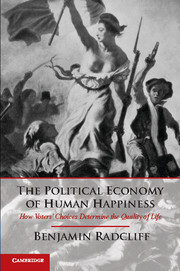Book contents
- Frontmatter
- Contents
- Acknowledgments
- Introduction
- 1 The Democratic Pursuit of Happiness
- 2 Market Democracy
- 3 Citizens or Market Participants?
- 4 The Scientific Study of Happiness
- 5 The Size of the State
- 6 Labor Unions and Economic Regulation
- 7 The American States
- 8 Between Market and Morality
- References
- Index
Introduction
Published online by Cambridge University Press: 05 March 2013
- Frontmatter
- Contents
- Acknowledgments
- Introduction
- 1 The Democratic Pursuit of Happiness
- 2 Market Democracy
- 3 Citizens or Market Participants?
- 4 The Scientific Study of Happiness
- 5 The Size of the State
- 6 Labor Unions and Economic Regulation
- 7 The American States
- 8 Between Market and Morality
- References
- Index
Summary
In 1949, Albert Einstein published an essay in which he asked “how the structure of society…should be changed in order to make human life as satisfying as possible?” This is, of course, the question that has always enlivened and informed democratic politics: What should government do to best contribute to a world in which citizens lead positive and rewarding lives? It is here that we find the foundational issue over which candidates and political parties ultimately base their philosophical appeals to the public – what specific public policies contribute to better lives? Of course, given that the structural conditions that promote happiness are political goods, there is naturally political conflict – which is to say ideological conflict – over what policies we should adopt in furthering the greatest happiness for the greatest number.
This ideological competition is inherent, as we will have ample occasion to see in the pages that follow, because the production and distribution of human well-being takes place within the context of a market economy. As the most basic and important aspects of the “structure of society” are inevitably economic, any approach to “making human life as satisfying as possible” will itself of necessity depend upon the fundamental social choice between the two approaches available for governing a market economy. The Right suggests that we leave well-being to the individual choices of free citizens in a free market, with politics largely limited to maintaining those liberties. The Left, by contrast, maintains that happiness is best served by an activist state that consciously seeks to improve the human lot by grafting principles of equity and justice to market outcomes. For the Right, the economy should be self-governing, and thus ultimately outside the purview of democracy. For the Left, the economy is a center of public power, and thus must be considered as subject to democratic principles, so that its power can be used in the public interest. It is this core distinction that has been the most persistent and contested axis of political debate from the birth of the modern liberal democratic state at the close of the eighteenth century to the present.
- Type
- Chapter
- Information
- The Political Economy of Human HappinessHow Voters' Choices Determine the Quality of Life, pp. 1 - 9Publisher: Cambridge University PressPrint publication year: 2013



